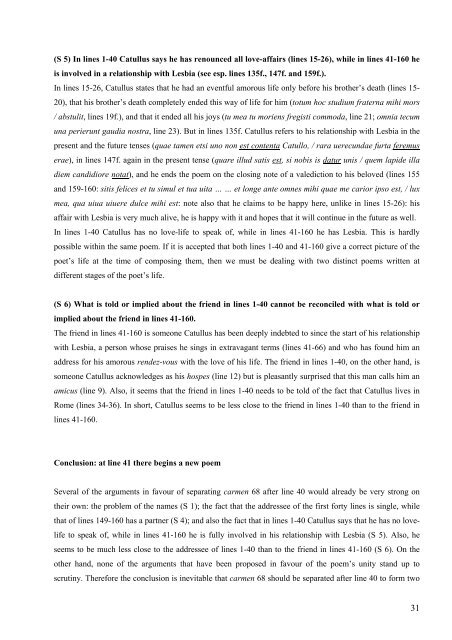CATULLUS 68 - Scuola Normale Superiore
CATULLUS 68 - Scuola Normale Superiore
CATULLUS 68 - Scuola Normale Superiore
You also want an ePaper? Increase the reach of your titles
YUMPU automatically turns print PDFs into web optimized ePapers that Google loves.
(S 5) In lines 1-40 Catullus says he has renounced all love-affairs (lines 15-26), while in lines 41-160 he<br />
is involved in a relationship with Lesbia (see esp. lines 135f., 147f. and 159f.).<br />
In lines 15-26, Catullus states that he had an eventful amorous life only before his brother’s death (lines 15-<br />
20), that his brother’s death completely ended this way of life for him (totum hoc studium fraterna mihi mors<br />
/ abstulit, lines 19f.), and that it ended all his joys (tu mea tu moriens fregisti commoda, line 21; omnia tecum<br />
una perierunt gaudia nostra, line 23). But in lines 135f. Catullus refers to his relationship with Lesbia in the<br />
present and the future tenses (quae tamen etsi uno non est contenta Catullo, / rara uerecundae furta feremus<br />
erae), in lines 147f. again in the present tense (quare illud satis est, si nobis is datur unis / quem lapide illa<br />
diem candidiore notat), and he ends the poem on the closing note of a valediction to his beloved (lines 155<br />
and 159-160: sitis felices et tu simul et tua uita … … et longe ante omnes mihi quae me carior ipso est, / lux<br />
mea, qua uiua uiuere dulce mihi est: note also that he claims to be happy here, unlike in lines 15-26): his<br />
affair with Lesbia is very much alive, he is happy with it and hopes that it will continue in the future as well.<br />
In lines 1-40 Catullus has no love-life to speak of, while in lines 41-160 he has Lesbia. This is hardly<br />
possible within the same poem. If it is accepted that both lines 1-40 and 41-160 give a correct picture of the<br />
poet’s life at the time of composing them, then we must be dealing with two distinct poems written at<br />
different stages of the poet’s life.<br />
(S 6) What is told or implied about the friend in lines 1-40 cannot be reconciled with what is told or<br />
implied about the friend in lines 41-160.<br />
The friend in lines 41-160 is someone Catullus has been deeply indebted to since the start of his relationship<br />
with Lesbia, a person whose praises he sings in extravagant terms (lines 41-66) and who has found him an<br />
address for his amorous rendez-vous with the love of his life. The friend in lines 1-40, on the other hand, is<br />
someone Catullus acknowledges as his hospes (line 12) but is pleasantly surprised that this man calls him an<br />
amicus (line 9). Also, it seems that the friend in lines 1-40 needs to be told of the fact that Catullus lives in<br />
Rome (lines 34-36). In short, Catullus seems to be less close to the friend in lines 1-40 than to the friend in<br />
lines 41-160.<br />
Conclusion: at line 41 there begins a new poem<br />
Several of the arguments in favour of separating carmen <strong>68</strong> after line 40 would already be very strong on<br />
their own: the problem of the names (S 1); the fact that the addressee of the first forty lines is single, while<br />
that of lines 149-160 has a partner (S 4); and also the fact that in lines 1-40 Catullus says that he has no lovelife<br />
to speak of, while in lines 41-160 he is fully involved in his relationship with Lesbia (S 5). Also, he<br />
seems to be much less close to the addressee of lines 1-40 than to the friend in lines 41-160 (S 6). On the<br />
other hand, none of the arguments that have been proposed in favour of the poem’s unity stand up to<br />
scrutiny. Therefore the conclusion is inevitable that carmen <strong>68</strong> should be separated after line 40 to form two<br />
31






